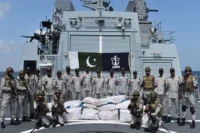The Middle East has long been a battleground for major powers in accordance with its significant geostrategic landscape and potential energy resources following possession of five mammoth seas – the Caspian Sea, the Black Sea, the Mediterranean Sea, the Red Sea and the Persian Gulf. The region proudly owns 52.5% of the total crude oil reserves of the world as well as 44.6% of total natural gas reserves.
The Middle East is a home to multiple ethnic groups and are frequently entangled in various conflicts and crises which is not only vitiating the stable atmosphere but also promoting outside powers to rush in this conflict-prone region and achieve their nefarious designs under the garb of volatility and instability.
The sectarian issue has been ingrained in the roots of Middle East’s regional politics but the Saudi-Iranian rivalry for the quest of regional hegemony has further emboldened the spirit of sectarian politics. On the one hand, the post-Saddam Shia regime in Iraq as well as Arab Spring have blessed Iran with increased leverage and greater influence and on the other hand, Sunni monarchies’ activism has added to the sense of instability and the politics of sectarian cleavages in the region.
Syria is gonna be a forthcoming bastion for the prevailing wave of sectarianism. The country seems to be an emerging political structure to reinforce sectarian factions and escalate sectarian tensions in the region. Iraq, Yemen, Lebanon and Bahrain are also going through the phase of sectarian apprehensions that can be possibly exploited by external powers.
To be pertinent, the US invasion of Iraq in 2003 and the devastating repercussions of the Arab uprisings in 2011 have overwhelmingly contributed in terms of triggering an environment fraught with ever-lasting turmoil and pandemonium. In addition, the signing of the Iran Nuclear Deal known as the Joint Comprehensive Plan of Action (JCPOA) has also added to the insecurities and tensions in the already-plagued region.
The outside powers -the USA, China and Russia- are playing an active role in the region. The sole objective of the US has been to maintain its predominance in the region by employing all means of power including military force. To prevent the spread of nuclear weapons had been another key interest of the US in the Middle East in order to preserve its interests regarding oil security or Israel security concerning the palpable Iranian potential threat. Ergo, the United States has maintained a range of security relationships in numerous Middle Eastern countries.
In the post-cold war era, the Russian engagement with the Middle East can be viewed through the prism of counteracting separatist movements at North Caucasus in Russia being financed by the Gulf countries. Russia faced severe criticism from Muslim countries for suppressing Chechen struggles to the right of self-determination but Russia’s opposition to the Iraq war and anti-Western rhetoric have helped bridged the gap and have gotten engaged with several Middle Eastern states economically. Their economic relations cover three areas: arm sales, energy supply and investment, thus playing an active role in the region.
Undeniably, China is heavily depended on energy resources. China’s primary interest in the Middle East has been only to meet its energy needs but simmering tensions in East Asia have compelled Chinese policy makers to launch two mega initiatives – the Silk Road Economic Belt and the Maritime Silk Road in order to construct ports and adopt cheap and sustainable trade routes through Central Asia and the Middle East. Furthermore, internal security and stability of China and the Middle East seem to be correlative. They can have a mutual influence which has forced China to act as a cautious player in Middle East affairs.
In a nutshell, the blazing fire of sectarian rivalry by regional players and the exploitation of energy resources by extra-regional players are central regarding perpetual violence and regional instability. Until and unless, the mistrust and suspicion among the key players tend to rein, the prospects of peace are darkened in the troubled region.
Stay tuned to Baaghi TV for more. Download our app for the latest news, updates & interesting content!






